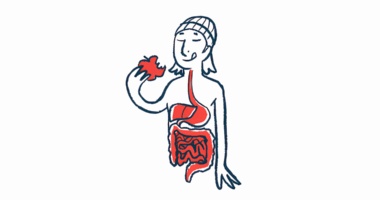The things we don’t like talking about, part 2
A columnist shares her experiences with constipation and Parkinson's

Last in a series. Read part one.
Recently, I had terrible abdominal pain in the middle of the night. It was so bad that I was doubled over and couldn’t sleep. I thought it was appendicitis, or kidney stones, or maybe diverticulosis. I tried to walk it off and put heating pads on my belly, but the pain persisted. Four hours later, when I started to feel nauseous, I decided it was time to go to urgent care, because obviously this was something serious.
I packed my Parkinson’s medication and my deep brain stimulation (DBS) remote in case I needed an X-ray or MRI. Then my husband, John, and I hopped in the car.
Finally, we arrived at urgent care. Because it had just opened at 8 a.m., we were hoping to be near the front of the line. Wrong! Many, many people were ahead of us. Sigh.
I took advantage of the waiting time to let our daughters know what was going on, and I canceled my plan for the day, which was to go for a walk with a bunch of my boxing buddies. I was preparing everyone for the worst.
Eventually, it was my turn, and after the blood tests, I needed X-rays. Good thing I remembered the remote.
Explaining DBS to the X-ray technicians was an interesting experience, as neither of them had ever heard of it. We explained how, with the remote, John would turn the device off, so they could take the X-ray, and then he would turn it on again. They were fascinated by how quickly I started to tremor when John turned it off, and how the tremor almost immediately stopped when he turned the device back on.
It was worth the discomfort of the tremor if the X-ray could show what was wrong.
Not the answer I expected
After five hours at urgent care, I had my answer: constipation! I was so embarrassed. But I was also relieved that it wasn’t a burst appendix or something more grim. It was something that could be managed. Even though this diagnosis was slightly humiliating, it brought a wave of hope in its simplicity. I was ready to tackle it head-on.
The next day, I walked into boxing class, and of course, my friends asked how I was because they had heard that I had spent the day in the hospital. I whispered to them, “Apparently, I’m constipated.” I felt so awkward.
Constipation can have serious consequences for people with Parkinson’s disease. While urinary issues can often signal disease progression, the Parkinson’s Foundation notes that constipation is a common early symptom of the disease. Many of us have had issues with constipation our whole life.
With that in mind, I’ve decided to take the diagnosis as a challenge to drink more fluids and eat more fruits, vegetables, and whole grains. But mostly to stop feeling like a jerk because I didn’t realize what was going on.
Constipation, no matter how unpleasant a topic, is an essential piece of the symptom management puzzle and an important conversation to have with your doctor. Recognizing and addressing constipation in Parkinson’s is crucial for effective treatment and overall well-being. Like urinary issues, it’s a topic that needs to be brought to light and discussed openly.
Note: Parkinson’s News Today is strictly a news and information website about the disease. It does not provide medical advice, diagnosis, or treatment. This content is not intended to be a substitute for professional medical advice, diagnosis, or treatment. Always seek the advice of your physician or another qualified health provider with any questions you may have regarding a medical condition. Never disregard professional medical advice or delay in seeking it because of something you have read on this website. The opinions expressed in this column are not those of Parkinson’s News Today or its parent company, Bionews, and are intended to spark discussion about issues pertaining to Parkinson’s disease.








Leave a comment
Fill in the required fields to post. Your email address will not be published.